
 |
||||||
|
GAY
FILM REVIEWS BY MICHAEL D. KLEMM
|
||||||
|
La Cage Aux Folles
Director:
Screenplay:
Starring:
Rated R, 103 minutes
The Birdcage MGM Video, Director: Screenplay: Starring: Rated R, 199 minutes |
Guess
Who's Coming To Dinner?
La Cage Aux Folles (1978) is, quite simply, one of the funniest farces ever filmed. Younger gay audiences are probably more familiar with the 1996 remake, The Birdcage, but they owe it to themselves to check out the original French film because it is one of the true masterpieces of screen comedy. Although famed director Mike Nichols assembled a vast stable of talent for the remake - and his film certainly has it moments - The Birdcage still pales compared to its predecessor. This essay will discuss both titles in sequence. I am assuming that most of my readers have seen one, or both, films. For those who haven't, there are major spoilers ahead. |
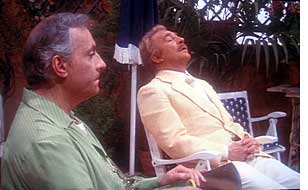 La
Cage Aux Folles
has always been a very special film to me. My first viewing was back in
1979, when I was a closeted senior in college, and it was the first film
that I had ever seen that treated the subject of homosexuality with sympathy.
La Cage Aux Folles was outrageous
and, despite its extreme levity, the film had a serious point to make. Conventional
notions of family and morality were challenged and turned upside down, yet
only the most ingrained homophobe could watch this film and still cling
to his bigotry. La
Cage Aux Folles
has always been a very special film to me. My first viewing was back in
1979, when I was a closeted senior in college, and it was the first film
that I had ever seen that treated the subject of homosexuality with sympathy.
La Cage Aux Folles was outrageous
and, despite its extreme levity, the film had a serious point to make. Conventional
notions of family and morality were challenged and turned upside down, yet
only the most ingrained homophobe could watch this film and still cling
to his bigotry. |
|
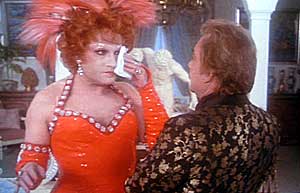 Ugo
Tognazzi and Michel Serrault are Renato Baldi and Albin Mougeotte, a longtime
gay couple who have been partners for twenty years. Together, they own a
night club in Saint-Tropez named La Cage Aux Folles (which translates as
Birds of a Feather). The night club's specialty is fabulous drag revues
and Albin is 'Zaza Napoli,' the main attraction and the sensational star
of its stage. Albin is also the diva from hell and La
Cage opens with the temperamental star having a hissy fit
in his dressing room and refusing to perform. Apparently this is a nightly
ritual and Renato is at his wits' end. To call Albin a screaming queen would
be an understatement and the verbal sparring during this scene is pitched
at such a level that is surprising that they do not kill one another. Ugo
Tognazzi and Michel Serrault are Renato Baldi and Albin Mougeotte, a longtime
gay couple who have been partners for twenty years. Together, they own a
night club in Saint-Tropez named La Cage Aux Folles (which translates as
Birds of a Feather). The night club's specialty is fabulous drag revues
and Albin is 'Zaza Napoli,' the main attraction and the sensational star
of its stage. Albin is also the diva from hell and La
Cage opens with the temperamental star having a hissy fit
in his dressing room and refusing to perform. Apparently this is a nightly
ritual and Renato is at his wits' end. To call Albin a screaming queen would
be an understatement and the verbal sparring during this scene is pitched
at such a level that is surprising that they do not kill one another. |
|
|
|
|
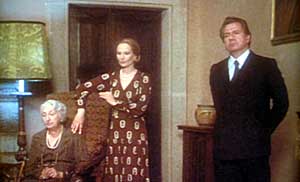 And
then, the true comedic genius of La Cage Aux
Folles comes into full bloom. The action swiftly cuts to
Laurent's finance, Andrea, and her parents, Simon and Louise Charrier.
They resemble medieval schoolmasters and they are demanding to know what
the boy's parents do for a living. Simon, we will soon learn, is the Deputy
Minister of The Union For Moral Order. The poor girl is terrified of her
parents and lies that Renato is a Cultural Attache for the Italian Embassy
and Albin is a housewife with six children. And
then, the true comedic genius of La Cage Aux
Folles comes into full bloom. The action swiftly cuts to
Laurent's finance, Andrea, and her parents, Simon and Louise Charrier.
They resemble medieval schoolmasters and they are demanding to know what
the boy's parents do for a living. Simon, we will soon learn, is the Deputy
Minister of The Union For Moral Order. The poor girl is terrified of her
parents and lies that Renato is a Cultural Attache for the Italian Embassy
and Albin is a housewife with six children. |
|
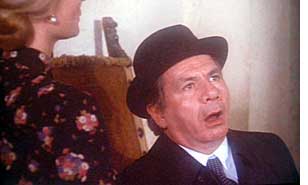 But
wait, it gets even better. Simon receives a phone call the next day and
learns that the President has just been found dead in the arms of a prostitute...
who is also a minor... and black. The press is already having a field day
at Simon's expense and The Union For Moral Order is the laughing stock of
France. But Louise has the answer - invite the press to a big public white
wedding where he gives his daughter's hand in marriage to the son of a diplomat.
"Morality, background, tradition! Restored!" beams his wife. They can even
get the Pope's blessing. But
wait, it gets even better. Simon receives a phone call the next day and
learns that the President has just been found dead in the arms of a prostitute...
who is also a minor... and black. The press is already having a field day
at Simon's expense and The Union For Moral Order is the laughing stock of
France. But Louise has the answer - invite the press to a big public white
wedding where he gives his daughter's hand in marriage to the son of a diplomat.
"Morality, background, tradition! Restored!" beams his wife. They can even
get the Pope's blessing. |
|
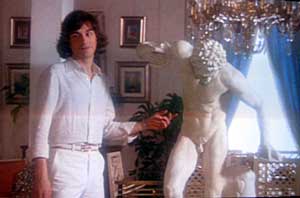 Meanwhile,
Albin is also shocked that their little boy is getting married. To a woman.
"It hurts at first," he whines while wiping away copious tears. But it's
going to hurt a lot more soon. The Charriers are on their way to meet their
future in-laws and this meeting is going to be... shall we say, awkward?
Laurent begs his father to redecorate their very garish apartment
and to send Albin away for a few days. Renato is understandably outraged
and refuses, but then gives in even though his son has got to be the most
ungrateful brat who has ever lived. An elaborate charade ensues and the
climactic dinner, as the two families with their clashing values meet, is
perhaps the funniest French farce since Moliere. Meanwhile,
Albin is also shocked that their little boy is getting married. To a woman.
"It hurts at first," he whines while wiping away copious tears. But it's
going to hurt a lot more soon. The Charriers are on their way to meet their
future in-laws and this meeting is going to be... shall we say, awkward?
Laurent begs his father to redecorate their very garish apartment
and to send Albin away for a few days. Renato is understandably outraged
and refuses, but then gives in even though his son has got to be the most
ungrateful brat who has ever lived. An elaborate charade ensues and the
climactic dinner, as the two families with their clashing values meet, is
perhaps the funniest French farce since Moliere. |
|
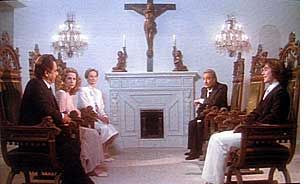 It
is a rare film that can still make me convulse with laughter even after
more than a dozen viewings. The number of funny scenes in La
Cage Aux Folles are too numerous to list. Their apartment
looks like a bordello and, to impress the future in-laws, it is redecorated
to resemble a monastery. At the disastrous dinner, soup is hastilly served
before the Charriers can notice the pictures of naked Greek athletes wrestling
in the bowls. When the papprarazzi arrives with cameras in tow to capture
Simon leaving the gay nightclub, Albin dresses the humiliated Deputy up
as the ugliest woman you will ever see. It
is a rare film that can still make me convulse with laughter even after
more than a dozen viewings. The number of funny scenes in La
Cage Aux Folles are too numerous to list. Their apartment
looks like a bordello and, to impress the future in-laws, it is redecorated
to resemble a monastery. At the disastrous dinner, soup is hastilly served
before the Charriers can notice the pictures of naked Greek athletes wrestling
in the bowls. When the papprarazzi arrives with cameras in tow to capture
Simon leaving the gay nightclub, Albin dresses the humiliated Deputy up
as the ugliest woman you will ever see. |
|
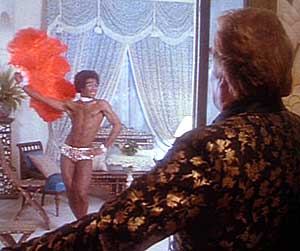 Two
minor, but memorable, characters round out the cast. One is Laurent's biological
mother, who has had no contact with her son since his birth. Laurent, we
learn, is the result of a drunken liaison that lasted one night from 2:30
to 3:45. The other is Renato and Albin's "maid" - a muscular black man named
Jacob who loves to wear skimpy French maid uniforms and Albin's wigs. Did
I just say a black "maid?" Wait; before someone charges the film
with racism, Jacob has one of the film's best lines when Renato remarks
that "You French make such shitty coffee" and Jacob replies: "I've been
called nigger and I've been called queer but I've never been called
French." Also, as Laurent's demands become more and more excessive, an annoyed
Jacob sarcastically refers to the boy as his "little white master." Two
minor, but memorable, characters round out the cast. One is Laurent's biological
mother, who has had no contact with her son since his birth. Laurent, we
learn, is the result of a drunken liaison that lasted one night from 2:30
to 3:45. The other is Renato and Albin's "maid" - a muscular black man named
Jacob who loves to wear skimpy French maid uniforms and Albin's wigs. Did
I just say a black "maid?" Wait; before someone charges the film
with racism, Jacob has one of the film's best lines when Renato remarks
that "You French make such shitty coffee" and Jacob replies: "I've been
called nigger and I've been called queer but I've never been called
French." Also, as Laurent's demands become more and more excessive, an annoyed
Jacob sarcastically refers to the boy as his "little white master." |
|
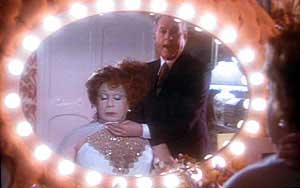 Some
have complained that La Cage Aux Folles
perpetuated stereotypes, and Renato and Albin have even been called the
Amos and Andy of Gaydom. Yes, they are a pair of flaming queens
but they weren't objects of ridicule and this is the crucial difference
- certainly not the norm in films at the time. Renato and Albin are utterly
delightful and the audience laughs with them and not at
them. Which is more than I can say for the sanctimonious Simon Charrier
and his wife. Renato and Albin might be a tad eccentric, but audiences embraced
them and recognized that they were harmless. As opposed to the Charriers,
with their rigid beliefs and prejudices, who are downright dangerous! Some
have complained that La Cage Aux Folles
perpetuated stereotypes, and Renato and Albin have even been called the
Amos and Andy of Gaydom. Yes, they are a pair of flaming queens
but they weren't objects of ridicule and this is the crucial difference
- certainly not the norm in films at the time. Renato and Albin are utterly
delightful and the audience laughs with them and not at
them. Which is more than I can say for the sanctimonious Simon Charrier
and his wife. Renato and Albin might be a tad eccentric, but audiences embraced
them and recognized that they were harmless. As opposed to the Charriers,
with their rigid beliefs and prejudices, who are downright dangerous!
|
|
| Do the "politically correct" amongst you still think that Albin is too much of a drama queen? Well, then take a closer look at Simon. The temper tantrums that he throws throughout the film are as histrionic as Albin's - his voice is just a few octaves lower. Also, like Albin, he craves chocolate whenever he is stressed. | |
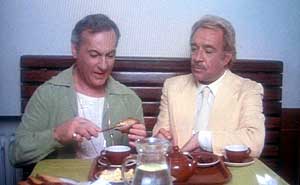 Ugo
Tognazzi and Michel Serrault were both noted European actors; Tognazzi usually
played tough guys, and was actually once a heartthrob in Italy, and he is
beautifully cast against type in La Cage.
Fans of Phillipe deBroca's classic anti-war comedy, King Of Hearts,
will recognize Serrault as the barber who pays his customers because he
"hates to see the shop empty." Their chemistry together and comic timing
is sublime. This is a film that knows how to tell a joke correctly, utilizing
the actors, the photography and the cutting for maximum effect. Look, for
example, at the classic scene where Renato tries to teach Albin how to act
more "like a man." Following Renato's exasperated instructions, Albin tries
to forcefully butter his toast and then screams each time the toast that
he clenches in his hand keeps snapping in half. The lesson concludes with
Renato unsuccessfully trying to teach Albin how to walk like John Wayne. Ugo
Tognazzi and Michel Serrault were both noted European actors; Tognazzi usually
played tough guys, and was actually once a heartthrob in Italy, and he is
beautifully cast against type in La Cage.
Fans of Phillipe deBroca's classic anti-war comedy, King Of Hearts,
will recognize Serrault as the barber who pays his customers because he
"hates to see the shop empty." Their chemistry together and comic timing
is sublime. This is a film that knows how to tell a joke correctly, utilizing
the actors, the photography and the cutting for maximum effect. Look, for
example, at the classic scene where Renato tries to teach Albin how to act
more "like a man." Following Renato's exasperated instructions, Albin tries
to forcefully butter his toast and then screams each time the toast that
he clenches in his hand keeps snapping in half. The lesson concludes with
Renato unsuccessfully trying to teach Albin how to walk like John Wayne. |
|
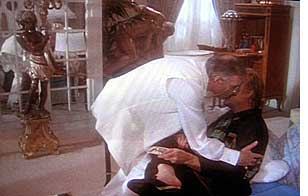 Yet,
despite all the drama, it is clear that Renato and Albin truly love each
other. They bicker and then reconcile like Lucy and Ricky Ricardo and, after
awhile, the straights in the audience forget that they are watching two
men. Renato tells Albin that he is a pain in the ass but confesses that
he still loves him because "you make me laugh." Some critics complained
that we never see them kiss or show any signs of affection. Wrong. We do
see them kiss; it only happens once but it does happen. Early
in the film, Albin returns from shopping and kisses Renato and the director
doesn't call any attention to it. Perhaps it is so subtle that no one noticed.
(In the remake, the two men also kiss just once and during the same scene.) Yet,
despite all the drama, it is clear that Renato and Albin truly love each
other. They bicker and then reconcile like Lucy and Ricky Ricardo and, after
awhile, the straights in the audience forget that they are watching two
men. Renato tells Albin that he is a pain in the ass but confesses that
he still loves him because "you make me laugh." Some critics complained
that we never see them kiss or show any signs of affection. Wrong. We do
see them kiss; it only happens once but it does happen. Early
in the film, Albin returns from shopping and kisses Renato and the director
doesn't call any attention to it. Perhaps it is so subtle that no one noticed.
(In the remake, the two men also kiss just once and during the same scene.) |
|
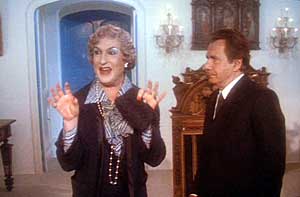 There
is also genuine pathos in La Cage Aux Folles.
It is sad to see these two men, used to living their lives so openly, suddenly
being forced to pass as straight. Albin looks so uncomfortable and pathetic
when he makes the effort and dresses in a conservative suitcoat; his pink
socks are his one last vain attempt to maintain his identity and you almost
want to cry when he says "No. Dressed like this I'm even more ridiculous."
He is far more in his element when he makes a surprise entrance, in drag,
to masquerade as Laurent's mother when the Charriers arrive for dinner. There
is also genuine pathos in La Cage Aux Folles.
It is sad to see these two men, used to living their lives so openly, suddenly
being forced to pass as straight. Albin looks so uncomfortable and pathetic
when he makes the effort and dresses in a conservative suitcoat; his pink
socks are his one last vain attempt to maintain his identity and you almost
want to cry when he says "No. Dressed like this I'm even more ridiculous."
He is far more in his element when he makes a surprise entrance, in drag,
to masquerade as Laurent's mother when the Charriers arrive for dinner. |
|
|
Every straight person who I have ever seen the film with has reacted to it the same way. They all agreed that the Deputy Minister of The Union For Moral Order was the one who was ridiculous and not the two "fags." La Cage Aux Folles was a milestone and its message is still very important even today, three decades later. Note: The less said about the two sequels, the better. La Cage Aux Folles II (1980) was an inane spy caper made somewhat palatable only by the chemistry between Tognazzi and Serrault. La Cage Aux Folles 3: The Wedding (1985), in which Albin has to get married and father a son in order to receive an inheritance, was so intolerable that I couldn't even finish watching it.
|
|
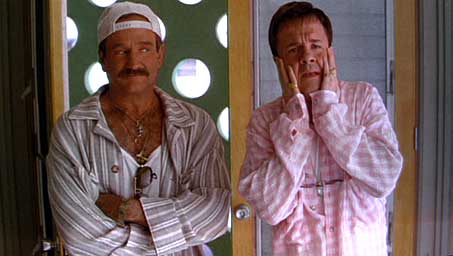 |
|
| There would not be an American remake for almost twenty years even though La Cage Aux Folles was, at the time, the highest-ever grossing foreign film to date. (In 1985, La Cage would become a Tony award winning musical with a book by Harvey Fierstein.) In 1996, noted stage and film director Mike Nichols (The Graduate) re-united with his old comedy partner, Elaine May, and assembled an all-star cast, to update La Cage. | |
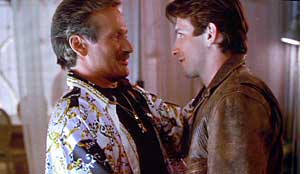 The
Birdcage,
aside from being transferred from Saint-Tropez to South Beach, Florida,
is essentially the same film as La Cage Aux Folles. Robin
Williams and Nathan Lane star as Armand and Albert Goldman. Their nightclub
is called The Birdcage, and Albert graces its stage as the great Starina.
Hank Azaria is the Guatemalan "maid" with a penchant for wearing Albert's
wigs, and Dan Futterman plays
the ungrateful son, Val, who sets chaos into motion. The
Birdcage,
aside from being transferred from Saint-Tropez to South Beach, Florida,
is essentially the same film as La Cage Aux Folles. Robin
Williams and Nathan Lane star as Armand and Albert Goldman. Their nightclub
is called The Birdcage, and Albert graces its stage as the great Starina.
Hank Azaria is the Guatemalan "maid" with a penchant for wearing Albert's
wigs, and Dan Futterman plays
the ungrateful son, Val, who sets chaos into motion. |
|
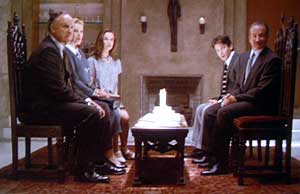 Their
nemesis is now a Jesse Helmes-styled conservative Senator. Gene Hackman
is a hoot as Ohio Senator Kevin Keeley, one of the founders of The Coalition
For Moral Order. Having the President of the United States die in the arms
of an underaged, black prostitute would have been a bit much and so this
time it's Keeley's Coalition co-founder, Senator Eli Jackson, whose comical
death sends the media into a feeding frenzy. To wag the dog, the wife, Louise
(Dianne West), again suggests a big white wedding for their daughter, Barbara
(Calista Flockhart). Their
nemesis is now a Jesse Helmes-styled conservative Senator. Gene Hackman
is a hoot as Ohio Senator Kevin Keeley, one of the founders of The Coalition
For Moral Order. Having the President of the United States die in the arms
of an underaged, black prostitute would have been a bit much and so this
time it's Keeley's Coalition co-founder, Senator Eli Jackson, whose comical
death sends the media into a feeding frenzy. To wag the dog, the wife, Louise
(Dianne West), again suggests a big white wedding for their daughter, Barbara
(Calista Flockhart). |
|
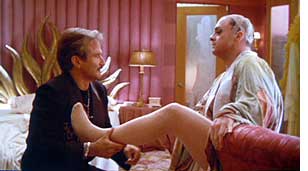 It
made sense to remake La Cage Aux Folles during the 90s because the
"family values" crowd was heating up their efforts to legislate homophobia
in America. Humor is a potent weapon and any big budget Hollywood film that
could help foster acceptance from mainstream audiences was certainly welcome.
The Birdcage makes the same
satiric point as La Cage does, and it is very funny, but somehow
it doesn't reach the same comedic heights as its predessessor. It
made sense to remake La Cage Aux Folles during the 90s because the
"family values" crowd was heating up their efforts to legislate homophobia
in America. Humor is a potent weapon and any big budget Hollywood film that
could help foster acceptance from mainstream audiences was certainly welcome.
The Birdcage makes the same
satiric point as La Cage does, and it is very funny, but somehow
it doesn't reach the same comedic heights as its predessessor. |
|
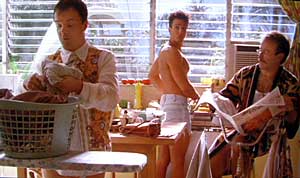 The
basic set-up of the story is so funny that it's almost impossible to screw
it up, yet many of the scenes that had me screaming with laughter in the
original are flat in the sequel. Somewhere along the line Albert's character
was toned down and I don't think that was wise. Starina is nowhere near
the hissy diva that Zaza was in the first film and the character
needs to be more over the top. You might say that the lady doth protest
too much in La Cage when Albin throws a fit on stage because his
young dancing partner chews gum and blows a bubble in his face, but in
which film was the tantrum funnier? The toast scene in the new film doesn't
come close to matching the comedic genius of the same moment in the original.
It's all in the timing. When Gene Hackman's Senator Keeley gets the phone
call that his Coalition co-founder is dead, his delivery is too rushed.
Whereas, in the first film, Simon Charrier was breathing heavy and muttering
slowly, with long pregnant pauses for comic effect: "She was a
prostitute....... and a minor...... and black." The
basic set-up of the story is so funny that it's almost impossible to screw
it up, yet many of the scenes that had me screaming with laughter in the
original are flat in the sequel. Somewhere along the line Albert's character
was toned down and I don't think that was wise. Starina is nowhere near
the hissy diva that Zaza was in the first film and the character
needs to be more over the top. You might say that the lady doth protest
too much in La Cage when Albin throws a fit on stage because his
young dancing partner chews gum and blows a bubble in his face, but in
which film was the tantrum funnier? The toast scene in the new film doesn't
come close to matching the comedic genius of the same moment in the original.
It's all in the timing. When Gene Hackman's Senator Keeley gets the phone
call that his Coalition co-founder is dead, his delivery is too rushed.
Whereas, in the first film, Simon Charrier was breathing heavy and muttering
slowly, with long pregnant pauses for comic effect: "She was a
prostitute....... and a minor...... and black." |
|
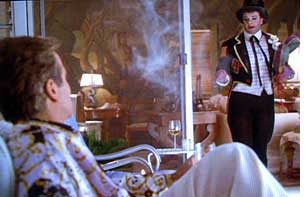 But
The Birdcage does have
many delightful touches of its own; one example is Albert returning from
the stage dressed as the hobo Judy Garland from Easter Parade. There
are a few improvements too; Renato allowed himself to be seduced by Laurent's
mother in the original but Armand just does his old dance number with her
this time and I liked this scene a lot better. Williams matches
Tognazzi when he rightly tells off his son and then says "Fuck the Senator,
I don't give a damn what he thinks." And I thought it was brilliant that,
when Albert came in un-announced at dinner, he was dressed - and looked
- like Barbara Bush. His winning over of the Senator with his dumb Republican
smalltalk (instead of killing abortion doctors, why don't we kill the mothers?)
is also hysterically funny. But
The Birdcage does have
many delightful touches of its own; one example is Albert returning from
the stage dressed as the hobo Judy Garland from Easter Parade. There
are a few improvements too; Renato allowed himself to be seduced by Laurent's
mother in the original but Armand just does his old dance number with her
this time and I liked this scene a lot better. Williams matches
Tognazzi when he rightly tells off his son and then says "Fuck the Senator,
I don't give a damn what he thinks." And I thought it was brilliant that,
when Albert came in un-announced at dinner, he was dressed - and looked
- like Barbara Bush. His winning over of the Senator with his dumb Republican
smalltalk (instead of killing abortion doctors, why don't we kill the mothers?)
is also hysterically funny. |
|
|
Again, if anyone
in the audience doesn't think that it's the Senator who is ridiculous
by the conclusion, then that person is watching the film with blinders.
And probably thinks George W. Bush was a good President. |
|
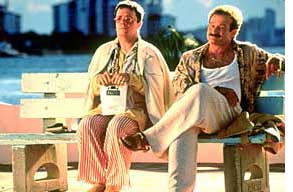 The
cast is, for the most part, terrific. Robin Williams is oddly subdued, considering
how manic he can sometimes be, but his subtle performance works. (His dry
one-liners include telling Agador that he looks like "Lucy's stunt double.")
Nathan Lane was a good choice but his Albert pales next to Michel Serrault's
Albin. Williams and Lane do have a nice chemistry together though
and, despite the bickering, seem much more happily married than the Keeleys.
Christine Baranski does a memorable turn as Val's biological mother, and
Hank Azaria literally steals every scene in which he appears as Agador. The
cast is, for the most part, terrific. Robin Williams is oddly subdued, considering
how manic he can sometimes be, but his subtle performance works. (His dry
one-liners include telling Agador that he looks like "Lucy's stunt double.")
Nathan Lane was a good choice but his Albert pales next to Michel Serrault's
Albin. Williams and Lane do have a nice chemistry together though
and, despite the bickering, seem much more happily married than the Keeleys.
Christine Baranski does a memorable turn as Val's biological mother, and
Hank Azaria literally steals every scene in which he appears as Agador. |
|
|
More on Mike Nichols: Robin Williams
also appears in: Dan Futterman
also appears in: Nathan Lane also
appears in: Christine Baranski
also appears in: |